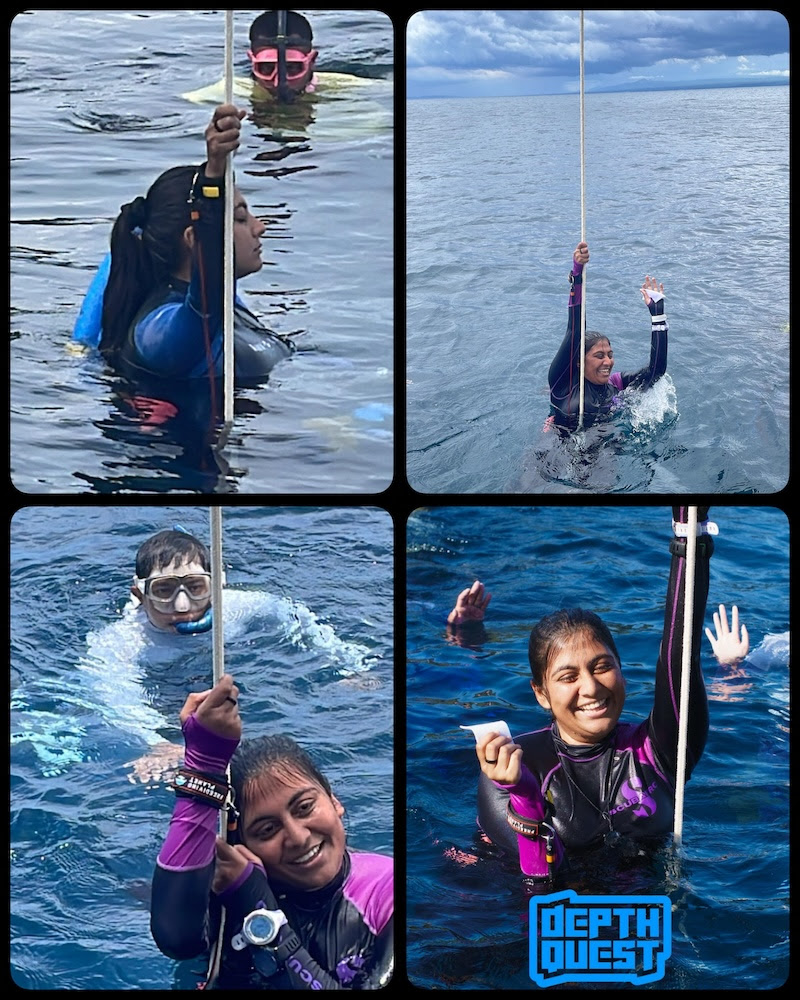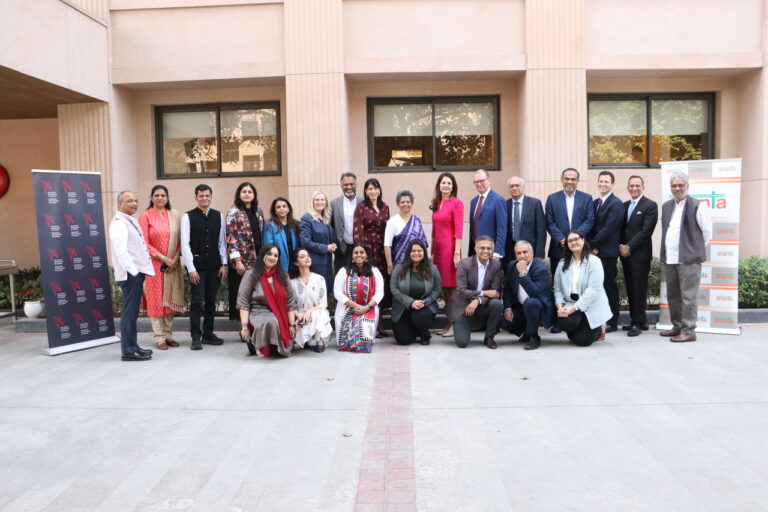MILESTONES
NEW INITIATIVE
Ananta Aspen and INME launch the NRGF- Omega Fellowship.

Ananta Aspen and INME joined hands to launch Navani Rising Generations Fellowship-Omega, a unique leadership development initiative for high school students of grades 9–12. The inaugural chapter was held at the INME Camp in Yercaud, Tamil Nadu, from April 5–12, 2025. It brought together 24 young participants from across India for a week of immersive learning.
Through values-based leadership modules and experiential activities, the Fellowship encouraged students to reflect deeply, discover their inner strengths, and define their individual leadership styles.

“Before NRGF-Omega, I never thought leadership could be about listening. The Socratic dialogues taught me to question better, understand different perspectives, and stay true to my values.”
– Hiya Mehra, The Bishops Junior College, Pune
The programme was moderated by Birla Fellows of Class 2, Rachita Sinha, Co-Founder, YouCan and Prachi Singhal, Independent Consultant, Social Impact who skillfully guided participants through sessions on self-awareness, collaboration, and purpose-driven action.
The programme provided a nurturing space for young minds to explore personal growth, build meaningful connections, and take confident steps toward becoming thoughtful, future-ready leaders. The success of this pilot edition paves the way for its thoughtful expansion in the years ahead.
MILESTONES
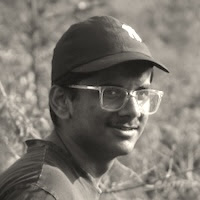
“The fellowship was an unforgettable journey where we challenged our minds through Socratic dialogues, pushed our limits with adventures like rock climbing, rappelling, and treks…along the way, building lasting friendships and memories. I’m grateful to be part of this amazing experience!”
– Anmol Yadav, GD Goenka School, Gurugram
The GP Birla Fellowship for Women Leaders Class 5 holds its first seminar
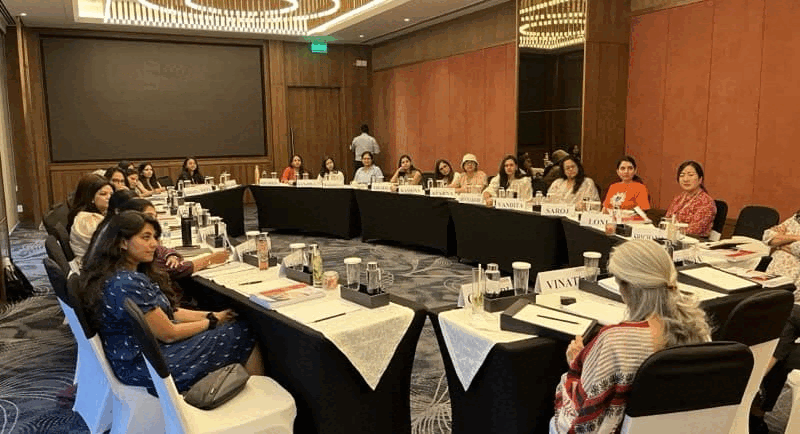
Class 5 of the GP Birla Fellowship for Women Leaders held its first seminar from April 8 to 13, 2025, at Radisson Blu, Faridabad. It brought together 22 remarkable women entrepreneurs from Tier II and III cities across India—including from Nagaland, Kutch, Khairthal and Satara. From diverse backgrounds, they collectively explored what it meant to lead with authenticity, courage, and compassion.
The seminar combined Socratic dialogue moderated by Vinati Kastia (Kamalnayan Bajaj Fellow), Senior Partner, AZB & Partners, and Dr Resham Sagari (Birla Fellow), Founder & CEO, Rida Wellness, with immersive experiential learning, encouraging fellows to reflect deeply on questions of human nature, ethics, power, and responsibility. Through readings from thinkers like Mencius, Hobbes, Rani Lakshmibai, and Margaret Thatcher, participants examined the inner and outer dimensions of leadership. Guided by Gayatri Das Sharma (facilitator for experiential learning), they engaged in powerful self-reflection sessions on personal values, leadership patterns, resilience, and well-being.
By the end of the week, the fellows emerged with a renewed sense of purpose, clarity, and connection—with themselves and each other. The seminar marked the beginning of a transformative journey from personal success to collective significance, grounded in sisterhood and shared commitment to change.
IN FOCUS
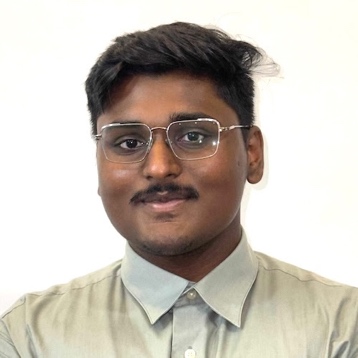
“I learnt that growth comes from both successes and setbacks.”
Mythili Sekar Sriram, Emerging Leaders Fellow
Mythili Sekar Sriram (Emerging Leader Fellow) is a final-year CSE student at the Kumaraguru College of Technology, Coimbatore. This former combat medic from the Singapore Armed Forces is currently a data analyst at Roche Pharma India. He undertook the Emerging Leaders Fellowship journey with Ananta Aspen; here, he shares how the experience shaped his worldview.
On, how the Emerging Leaders Fellowship transformed his thinking:
The Socratic dialogue sessions reshaped my perspective on success and failure. I have realised that both are temporary and have delinked them from being mere ‘achievements’. I now see success as living with purpose and integrity, while failure is merely an opportunity for growth.
I went into the fellowship primarily focused on technical expertise and career progression as a machine learning engineer. But after discussions on leadership, social responsibility, and personal values, I now seek to balance professional growth with societal contributions. The Mahabharata-based skit was especially memorable, allowing me to understand diverse worldviews and create lifelong bonds.
The fellowship reinforced the importance of values-based learning in fields like machine learning, where ethical decisions matter. I have learnt to focus on progress and not perfection and on the fact that growth comes from both successes and setbacks. By 28 or 30, I envision myself as a confident and self-aware machine learning engineer working on impactful projects in AI or data-driven innovation, contributing to solutions that address social challenges while mentoring others.
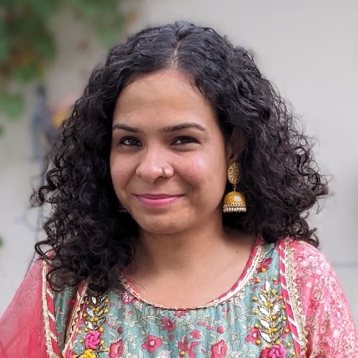
“For me, making a difference means action—seeing a problem and taking ownership of solving it."
Vandana, Founder, Rang Karwan; Birla Fellow Class
4
Vandana is an applied theatre practitioner and founder of Rang Karwan, an organisation that uses arts-based education to nurture conscious leadership in rural India. A journalist by training and artist at heart, she’s committed to community development, behavioural change, and sustainable living.
On Rang Karwan:
Rang Karwan is a women-led theatre and arts-based organisation working in rural Uttarakhand to foster local leadership and community-driven change. By creating safe, exploratory spaces rooted in applied theatre and the Theatre of the Oppressed, Rang Karwan helps adolescents and women critically examine issues of gender, education, and social justice. Their work empowers communities to move from awareness to advocacy, using art as a powerful tool for self-expression, healing, and collective action.
On shifting from a regular job to working for arts-based education at the age of 23:
Growing up in small towns across India, I experienced firsthand the limitations of conventional education—rote learning, lack of creative spaces, and gender-based restrictions. As a girl child with ADHD, I struggled within a rigid system that neither nurtured my learning style nor allowed me to follow my dreams. I was expected to finish school and get married, but I longed for something more—something that would keep my creative soul alive.
During my master’s, I joined a theatre group, and everything changed. The rehearsal spaces, reading sessions, dialogues, and bodywork introduced me to a completely different way of learning—one that was participatory, transformative, and deeply reflective of lived experiences. That realisation led me to quit my job and explore arts-based education as a tool for critical thinking, self-expression, and empowerment.
On the Art-Vocacy Project:
Art-Vocacy (Art + Advocacy) is Rang Karwan’s initiative to integrate arts-based pedagogies into community engagement and advocacy efforts. It equips local facilitators, NGOs, and community leaders with creative tools to foster trust, encourage dialogue, and drive social change.
For example, in Arunachal Pradesh, we trained students and women from self-help groups using Theatre of the Oppressed (TOTO). They later performed plays addressing drug abuse and gender discrimination, sparking critical conversations within their communities. Similarly, in Rajasthan, we used theatre-based interventions to train 30 women on financial literacy, helping them build confidence in supporting rural women with financial management.
Through collaborations with organisations like Sanjhi Sikhiya, Happy Children’s Library, NavGurukul, Greenpeace India, and Aagaaz Theatre Trust, we’ve adapted TOTO using movement, music, and visual arts to create meaningful conversations on gender, identity, and justice.
On her motivation to apply for the GP Birla Fellowship:
I was nominated by one of my mentors and initially saw it as a low-commitment opportunity that could add to my credibility. What truly drew me in, however, was the all-women cohort—a space I deeply cherish.
On the first day, as we read and discussed a poem, I found myself fully engaged. The readings and discussions that followed sparked an intellectual and emotional curiosity I hadn’t felt in a long time. By the end of the first seminar, I knew this was more than just a fellowship—it was a space for critical inquiry, deep reflection, and transformative learning.
On the challenging moments during the fellowship:
The biggest challenge was navigating my personal grief. My father had passed away just months before the fellowship, making it difficult to fully engage. As an introvert with low social energy, forming deep connections within the cohort was also challenging. Sitting through long discussions without the physical movement I was used to in theatre workshops made it even harder.
Beyond that, some readings pushed me to confront the more conflicted, darker sides of my consciousness. Sitting with that discomfort was tough, but it ultimately deepened my inner work and resilience. I left each seminar with thousands of thoughts, ideas, and questions—each pushing me toward deeper reflection and action.
As a grassroots practitioner, my instinct has always been to work directly on the ground, facilitating workshops. The fellowship challenged me to step back, analyse our impact at a systemic level, and develop frameworks that would allow Rang Kaarwaan to scale while staying true to its core principles.
On the biggest learning from the fellowship:
The dialogue. The fellowship created a space where we could bring in our contradictions, identities, ideologies, beliefs, and vulnerabilities. We held space for each other while challenging ideas of leadership, justice, democracy, and feminism. The readings framed our discussions beautifully, allowing us to push boundaries while remaining grounded in shared inquiry.
Another transformative aspect was the experiential sessions by Gayatri. They invited me to pause, reflect, and introspect—something I had been neglecting in my journey as a social entrepreneur. These exercises have now become a core part of how I lead and work with my team, allowing us to pause, process, and strategise with clarity.
On the post-programme transformation experienced at a personal or professional level:
The biggest transformation was in how I understood myself. I gained clarity on my core values, my leadership style, my blind spots, and the areas I need to work on to become a better leader, a better person, and a better citizen.
At an organisational level, I became more intentional about integrating reflection into our work. We refined our leadership model, ensuring young community leaders took ownership of our programmes. The fellowship also reinforced the importance of documenting our impact, which is now a priority for Rang Karwan’s future growth.
On if the fellowship is useful for leaders in the social sector, especially those working with rural communities:
Yes, especially for leaders working in rural areas. Many grassroots leaders lack access to structured learning opportunities, and geographic isolation makes it harder to engage in reflective spaces. The readings should be translated into vernacular languages, and regional versions of the fellowship could make it more inclusive, ensuring that those at the forefront of social change can benefit from these critical conversations.
The structured mentorship, peer learning, and exposure to diverse approaches allow rural practitioners to build sustainable models, strengthen their impact, and avoid burnout. It also bridges the gap between grassroots work and policy-level advocacy, ensuring that community voices inform systemic change.
On what the phrase ‘making a difference’ means personally:
For me, making a difference means action—seeing a problem and taking ownership of solving it. But that action starts with ourselves. I call it the PrAxis of Revolution—where inner transformation fuels external change.
This is why I am starting a blog series, PrAxis of Revolution, where I will explore the intersection of inner work and systemic change through my experiences in arts-based education, leadership, and advocacy. Because real change doesn’t just happen in policies or programmes—it happens when individuals awaken to their power, reclaim their agency, and begin to shift the world around them.
True impact is when change continues long after we step away—when a young fellow carries forward the work, when a survivor becomes a mentor, or when a community takes ownership of its own transformation. It’s about equipping individuals with the tools to challenge oppression, fostering spaces where learning is not dictated by hierarchy, and ensuring that communities have the agency to tell their own stories.
Watch video
MILESTONES
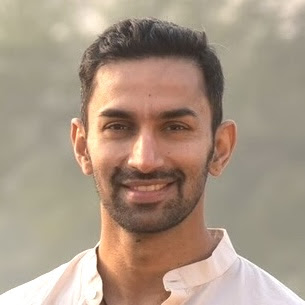
Kamalnayan Bajaj Fellow Manvendra Singh Shekhawat’s Dhun becomes India’s first real estate project to be certified as a B-Corp
Manvendra Singh Shekhawat is the Founder and CEO of Dhun and a Kamalnayan Bajaj Fellow of Class 9. Dhun has pioneered mixed-use neighbourhoods that hinge on regeneration. The project works to create a blueprint for the future of living—one that is inclusive and grounded in environmental, social, and physical well-being—by harmoniously blending traditional wisdom with modern technology. It transforms degraded arid land in peri-urban and rural areas into thriving human habitats through generational thinking and new urbanism.
Manvendra works at the intersection of experiential tourism, culture conservation, ecological restoration, and social entrepreneurship. Under his leadership, Dhun has emerged as one of four global urban development pilot projects—and the only one from India—to be supported by a partnership between Earthna, Qatar Foundation and The King’s Foundation, founded by HM King Charles III.
The project has also been featured by the Earthna Summit, UNGA 100 Disruptors Summit, UNCCD COP16, Earth One’s Atlantic Crossing, and Urban Land Institute (ULI) Asia Pacific Summit.
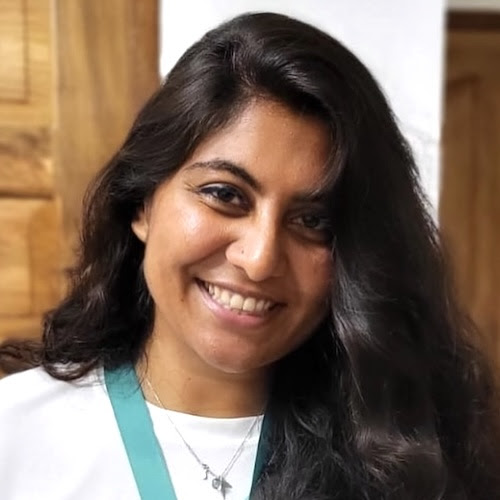
Birla Fellow Archana Sankara Narayanan sets national records in freediving at the AIDA Mabini Depth Quest, held in the Philippines
Archana Sankara Narayanan is a freediver from Chennai and a Birla Fellow. At the recently concluded AIDA Mabini Depth Quest held at the Lawom Pool Centre in Mabini, Philippines, from May 1 to 6, 2025, she secured four records and, in the process, surpassed one of her own. She now holds the national records in all four depth disciplines of freediving in the female category.
In Constant Weight (CWT), she dived 34m; in the Constant Weight No Fins (CNF) category, she reached 20m, while in the Constant Weight Bi-Fins (CWTB), she went down 32m. This competition was especially challenging for Archana given her ambitious goal to compete in all disciplines.
